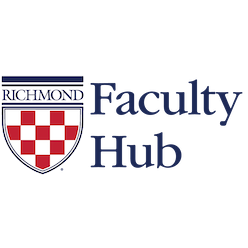We hope your fall semester is wrapping up nicely. We’d like to take this opportunity to share with you some of the great things happening in the Faculty Hub that you might have missed this past semester.
The Faculty Hub space is seeing more and more activity this semester as a ‘return to campus’ trend continues. Looking for meeting space or just a quiet place to deliver a zoom conference talk? From faculty conferences to departmental meetings, the Faculty Hub space on the third floor of Boatwright Library has lots of great options for your next meeting. Reach out to Jane Bise to learn more about ways you can utilize the Faculty Hub space.
Our fourth semester of Morning Blend, a weekly opportunity to learn something new, welcomed a number of campus partners to the Faculty Hub. We were joined by Laura Knouse, Associate Professor of Psychology, for a session on Healthy Boundaries, and Samantha Guss, Social Sciences Librarian, spoke about citation management (yay for Zotero)! Director of Grant Support, Jeanine Larson, also helped us demystify the grant writing process. Faculty Hub staff led many other great sessions like “First Day of Class” and “How to Take Advantage of UR’s Digital Pedagogy Toolbox.” You can find the full archive of the fall 2022 Morning Blend sessions here.
We also started a new coaching program for faculty wishing to work one on one with a faculty colleague or Faculty Hub staff. This semester that program has engaged faculty on wide ranging topics from: building code for a data science project to getting feedback on a new book proposal. If you are interested in engaging with the coaching program next semester, reach out to Kitty Maynard to learn more.
Faculty Hub staff facilitated 17 courses assessments his fall (an all-time semester high for us – woot!). This service helps faculty better understand the student experience in their classes and promotes student metacognition. Interested in using this service in one of your spring 2023 courses? Schedule a facilitated course assessment here, or reach out to Kylie Korsnack to learn more.
This fall we offered a variety of opportunities for faculty to explore and deepen their knowledge of inclusive pedagogies. We hosted our colleague Carlos Hurtado initiative for a workshop on strategies to promote a sense of belonging in the classroom, and we co-sponsored a session on Understanding the Hidden Curriculum with guest speaker, Rachel Gable. New this semester, we launched the Inclusive Pedagogy Cohort 2.0: Students as Partners as an expansion to the Inclusive Pedagogy Cohort initiative that has existed in the Provost’s Office since 2018. This new group consists of six faculty members and five students (Student Inclusive Pedagogy Consultants employed by the Faculty Hub) who are working together to explore the possibility of creating a student-faculty partnership program focused on inclusive pedagogy. Please reach out to Kylie Korsnack if you would like more information about any of these workshops or programs.
Creating time and space to learn more about our faculty scholarship is one of the goals of our Faculty Hub Talk series. This semester over lunch we learned more about the scholarship of our colleagues: Matthew Oware and Julie McConnell. We also heard about the inspiring projects by last year’s Faculty Fellows David Brandenberger, Monti Datta, and Julietta Singh. In addition to hearing about the scholarly efforts of our own faculty, we also welcomed nationally-known Helen Sword for a session on Writing Productively – it can be viewed here.
In collaboration with our faculty partners on the Faculty Technology Committee, we awarded three Digital Pedagogy grants this past semester. 3D scanning (creating a digital three-dimensional model of a physical object) were central to two awards: Lizzie Baughan was awarded funds for iPads with 3D scanning ability, and Sandy Williams was awarded funds for an EinScan H scanner for large scale scanning projects. These applications were funded through a one-time funding opportunity for equipment. As part of our recurring software funding process we approved Lauren Henley’s exploration of an AI powered discussion board tool (Packback) that promotes student learning through deeper engagement. If interested in applying for a Digital Pedagogy grant, email Andrew Bell to learn more.
